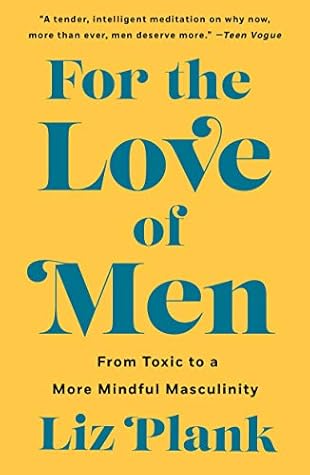More on this book
Community
Kindle Notes & Highlights
by
Liz Plank
Read between
September 10, 2019 - February 5, 2020
Violent men aren’t born; they’re created.
We act as if boys being terrible is inevitable, then act surprised when they fulfill these expectations.
Our research shows that boys’ underperformance in school has more to do with society’s norms about masculinity than with anatomy, hormones or brain structure.”
Lonely men are ignored while violent men are glamorized.
But what did those same movies teach young boys?
Because it’s so hard for us to see men as victims, their vulnerability is often invisible.
Where is the version of a feminist movement, but for men?
they were acting this way out of respect for conventional gender norms.
many men don’t ask for directions because confessing they are lost is interpreted as an admission of fault.
If men can’t ask for directions to the closest gas station, then how the hell are they supposed to ask for directions about being a man?
all the other ways that not asking questions revealed an inability to show intellectual vulnerability
Being a man felt less like an identity and more like a job or a reward you received only after going through excruciating circumstances.
unforgiving pressure to perform their masculinity constantly.
but womanhood isn’t lost through social acts;
Masculinity is procured through ritualized and often-public social behaviors.
No wonder men weren’t able to be vulnerable about their fears—they’re too busy pretending like they didn’t have any.
Idealized masculinity is the elephant in the room men have to simultaneously tame and yet pretend doesn’t exist.
the bigger the armor, the less men were aware that it was even there and the harder it would be to help them notice it.
“conspicuous eating or overeating as yet another of the myriad activities through which men attempt to establish dominance hierarchies.”
The group that was given the traumatizing task of braiding human hair were more likely to want to hit a punching bag over making a puzzle and were more likely to punch the bag harder.
when men feel less strong, they have all kinds of ways to compensate for it. And most of this isn’t conscious or intentional.
Another alarming study shows that when men are told they score lower on a masculinity scale, they are more likely to blame women for sexual assault.
The less marginalized you are, the more accepting society is of you breaking norms, because it doesn’t threaten an existing ruling system.
Women’s actions are accepted when the bending of expectations doesn’t threaten the existing moral order: it exists within it.
Saying men can wear pants but not skirts is like saying men can only eat square pizza because the round shape, well, that’s just for girls.
Yet we accept gendered norms about clothing as truth. We don’t ask questions because we assume it’s just the way things are, but perhaps it’s time to leave some of the rules about gender that regulate the lives of men that no longer serve us behind.
A social norm is only powerful to the extent that people are willing to respect it.
men end up imposing them on one another.
masculinity-restoring activities can quickly escalate and become ritualized violence against others to prove something about themselves.
The system works because it’s not questioned.
Maybe if we didn’t reflexively expect and require women to be so peaceful, and men to be so violent, they would act very differently.
testosterone doesn’t make you fight; you release it when you feel like you need to fight.
Because we believe these are innate differences, children learn that they are expected to exhibit certain traits and then go on to exhibit them.
isn’t the ultimate passivity suggesting that men are victims of their supposed brain wiring and can’t change?
she suppresses her own needs because she’s taught that the needs of others are more important—he suppresses his needs because he’s taught he doesn’t have any.
shame creates lies about how men should think and act, and when men don’t reach these impossible expectations they feel additional humiliation.
we keep silent rather than talk about it because we even lack the language and concepts to articulate our pain at being perpetrators and enablers of something we understand hurts us and others but can’t seem to stop,”
The patriarchy doesn’t just convince men that they don’t have emotional needs; it also leads men to feel embarrassed when those needs naturally occur, which leads those feelings to come out in other, less productive ways.
a fear of emotion was correlated with increased likelihood of aggression and hostility.
Showing violence becomes more acceptable than showing feelings.
what shames us ends up defining us.
It makes men feel shame and then enforces the omertà rule making that shame impossible to talk about.
The fact that male shame is not often discussed makes it that much more powerful and harder to shake.
But men are not expected to be vulnerable; they are expected to be strong, and our culture has determined that those two words are antonyms rather than synonyms.
Shame is not just a feeling; it’s a barrier to functioning.
“Real power doesn’t come through coercion. It comes through deep understanding, compassionate leadership and having a way to express a level of morality and ethics that makes you bigger than just a man.”
You’re a better man by knowing your weaknesses rather than ignoring them.”
Their girlfriends were telling them to open up, but society was still telling them to man up.
Women were walking away from emotionally abusive and deficient relationships because, for the first time in time in history, they could.
It made me sad to think that John didn’t think he could bring something valuable to the table as a man in a relationship unless it was money.


